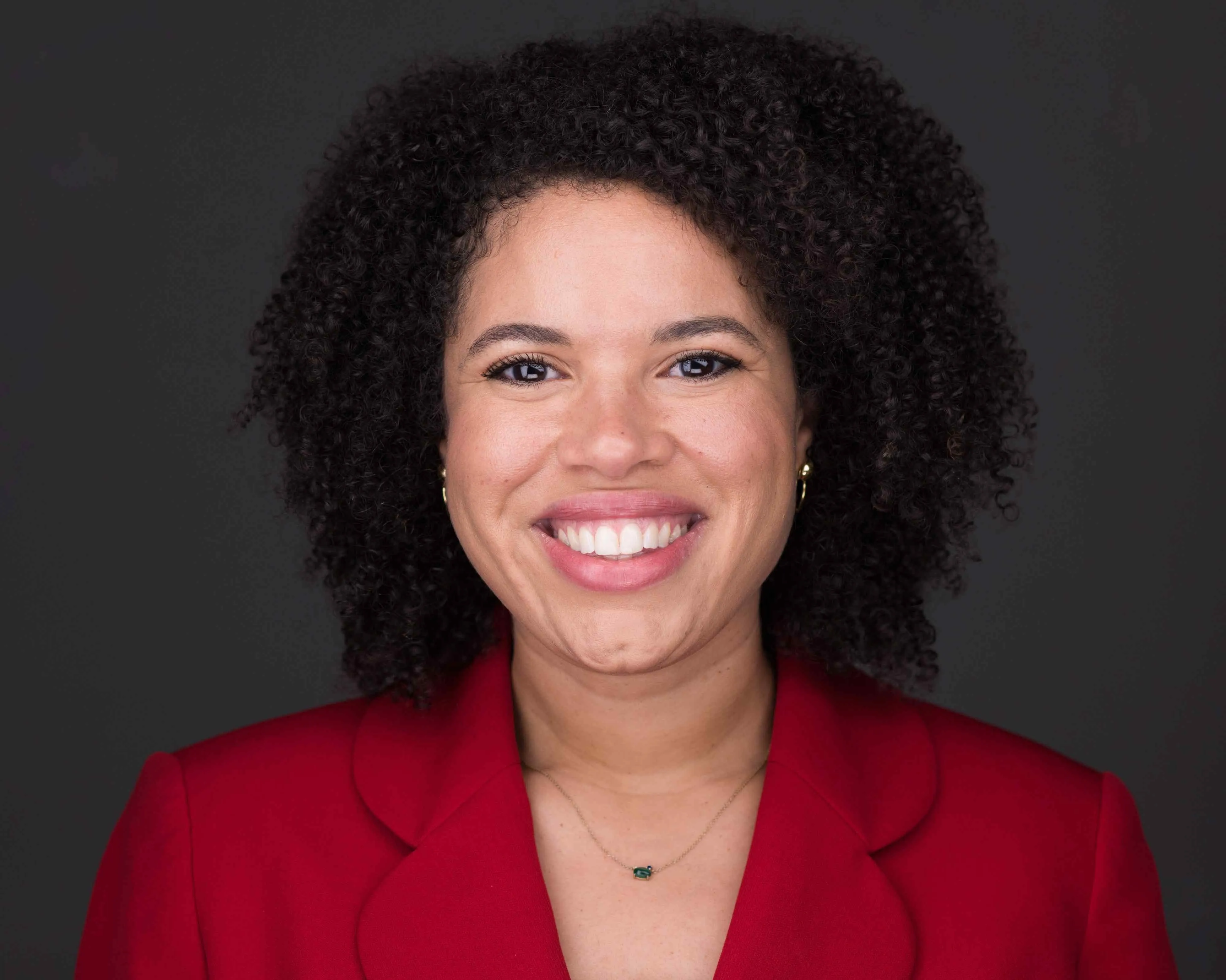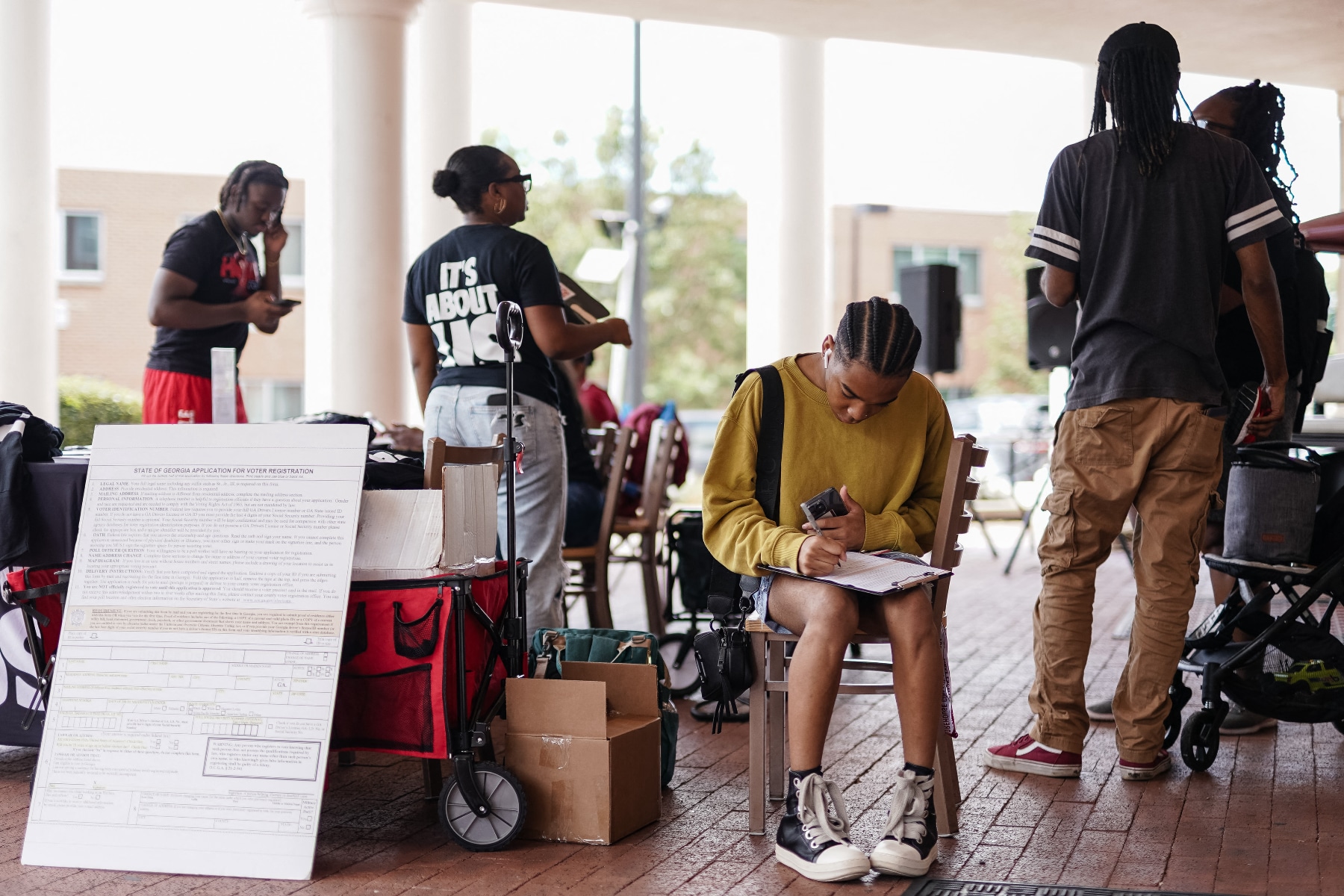Your trusted source for contextualizing abortion and Election 2024 news. Sign up for our daily newsletter.
On National Voter Registration Day, a push is underway to reach potential first-time voters, particularly in states with approaching registration deadlines. One group leading this effort is When We All Vote, the national nonpartisan initiative launched by former first lady Michelle Obama in 2018 to increase voting participation, close the racial voting gap and change the culture around voting.
“We take that last part really seriously. It’s a superpower,” the group’s executive director, Beth Lynk, told The 19th. “One of the ways we think about that holistically and the ‘why’ and ‘how’ of it all is engaging in conversations with voters and bringing voting to culture and really listening to culture when we talk about voting.”
When We All Vote is focusing Tuesday on the battleground state of Georgia, running a voter registration drive at the sold-out Atlanta Dream vs. Chicago Sky WNBA game, launching a merchandise collaboration with Playa Society and touring Georgia high schools with Hoop Bus to ensure eligible young people are registered to vote ahead of the October 7 deadline.
The 19th spoke with Lynk about When We All Vote’s Georgia push and working to reach young voters, in particular, throughout the country.
This interview has been lightly edited for length and clarity.
Jennifer Gerson, The 19th: When we talk about the push for voter registration this cycle, who are we talking about in terms of people who may not be registered yet?
Beth Lynk, When We All Vote: One of the things we do is listen, and first and foremost what we are really hearing is that the issues are top of mind for these voters — for Black voters, for young voters, for brown voters. They want to make their voices heard. We’re seeing a lot of that energy and it is really fueling this work in this moment.

How do you help connect for people that if there are issues they care about, these things can in fact be connected to voting? We hear so much about young people feeling jaded or disillusioned with government and its systems. How do you help translate what people care about to the power of the vote?
We actually don’t have to tell young voters what they care about is important because they know it’s important. We just ask, ‘What do you care about?’ and whether it’s issues like the economy or reproductive rights or gun violence or climate change, these issues are really top of mind and important. Where we are then taking it further is saying, ‘You know, let’s look at who is making decisions about you and who you are putting in a position to make decisions about your future and where do these folks sit?’ The answer is up and down the ticket. The truth is that 99 percent of the people that you’re voting for are at the state, local and municipal level.
So many of our Gen Z voters are voting for the first time in this election or were first able to vote in 2020, during the pandemic. If you’re a high schooler just voting for the first time or a young person who only knows voting in the context of Covid, what information do you need to best understand the process and what does this education look like?
Today we’ll also kick off a bus tour with Hoop Bus in high schools in Clayton County and Atlanta Public Schools to get eligible students registered to vote. That’s part of a larger initiative that we have to build the next generation of voters called the My School Votes initiative. Often when folks hear us talk about our co-chairs and ambassadors, they are expecting us to talk about the celebrities and artists that we bring together to raise their voice and elevate voting and democracy on our platforms. That’s important work, and we do do that work, but the other part of our ambassador program is building and increasing the voices talking about voting and democracy among high schoolers on their high school campus.
What does it mean to talk about voter suppression right now, especially in a place like Georgia, where you are today? What do you think is most important for people to understand about what access to the ballot box looks like in various communities in various states, especially for young people and young people of color?
Whether you’re looking at efforts to purge people from the voting rolls or not being allowed to use your student ID to register to vote, making it harder to vote early or cutting down on the number of polling places — none of this is a coincidence. It’s voter suppression and it disproportionately impacts young voters, Black voters, brown voters. And that’s intentional.
But that doesn’t mean that you don’t have power and you can’t take action to make sure that your voice is heard and empower your community to do it too. I think some of these efforts are intended to make you feel powerless, and one of the things we try to do is remind folks that you have power. Your voice matters. You are invited to participate in this process.
If you’re concerned that you or folks in your family are not registered because of a voter purge, it makes it all the more important to check your voter registration as a regular election year hygiene measure.
We know that Black Gen Z voters matter — if their vote wasn’t important, people wouldn’t try so hard to stop them from voting.
When we look at states like Georgia where you are today, where the election could come down to the margins, what’s most critical about Gen Z voters of color and what are you seeing in terms of momentum around interest in voting?
Earlier this year there was a lot of conversation — really, a fallacy — about young voters being apathetic or not being engaged. That’s just not true.
Anytime we talk to young voters, they are incredible engaged and are incredibly engaged by the issues — whether that’s reproductive rights or gun violence or climate change or the economy.
There are more than 40 million Gen Z voters, including 8 million young voters who are going to be casting their first vote in this election and who are interested in getting engaged.
Georgia is one place we are really seeing that momentum I spoke about. In Georgia, a third of the voters here are Black voters and young Georgians are incredibly motivated and energized. Since late July, we know that there are more than 40,000 young voters who are newly registered in Georgia alone.
We want people to know that the president is only one race on the ballot this year. Most of the people you will vote for are at the state or municipal or local level and those people make a huge impact on the issues that you care about. There are 135 seats in the House of Representatives up this cycle, 34 out of the 100 seats in the U.S. Senate, governor seats in 11 states, 85 of the country’s legislative chambers, and hundreds of state, local and special elections in addition to a number of ballot measures in a number of states that are doing to decide the future of issues to abortion access or access to marijuana. There’s a lot at stake here.
To check your voter registration status or to get more information about registering to vote, text 19thnews to 26797.





